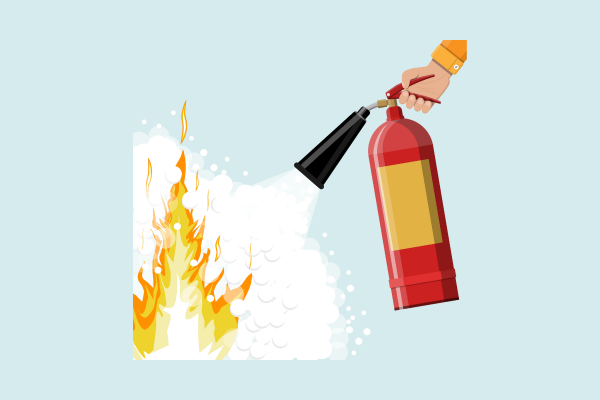Resolution 02/2024/NQ-HDTP guiding certain provisions on the crime of violating regulations on fire prevention and fighting.
Resolution 02/2024/NQ-HDTP Guiding Certain Provisions on Violations of Fire Prevention and Fighting Regulations
On May 24, 2024, the Judicial Council of the Supreme People's Court issued Resolution 02/2024/NQ-HDTP to guide the application of certain provisions in Article 313 of the Criminal Code 2015.
Accordingly, Resolution 02/2024/NQ-HDTP provides guidance on the application of certain provisions in Article 313 of the Criminal Code 2015 as amended and supplemented by the Law Amending the Criminal Code 2017 regarding violations of fire prevention and fighting regulations.
Resolution 02/2024/NQ-HDTP details violations of fire prevention and fighting regulations under Article 313 of the Criminal Code 2015 as follows:
- Violations of fire prevention and fighting regulations as stipulated by the Fire Prevention and Fighting Law.- Violations of fire prevention and fighting regulations as stipulated by other relevant laws.

Resolution 02/2024/NQ-HDTP Guiding Certain Provisions on Violations of Fire Prevention and Fighting Regulations
Guidelines on Criminal Accountability Under Clause 4, Article 313, Criminal Code 2015
Pursuant to Article 4 Resolution 02/2024/NQ-HDTP, guidelines on criminal accountability under Clause 4, Article 313 of the Criminal Code 2015 are as follows:
- "Violations of fire prevention and fighting regulations in cases with realistic potential to lead to consequences stipulated in points a, b, and c of Clause 3 of this Article if not promptly thwarted" under Clause 4, Article 313 of the Criminal Code 2015 refer to violations guided in Article 2 Resolution 02/2024/NQ-HDTP under the following circumstances:
+ No fire has occurred, but if not promptly thwarted, a fire would certainly occur, leading to the damage prescribed in points a, b, and c of Clause 3, Article 313 of the Criminal Code 2015.
+ A fire has already occurred and will inevitably lead to consequences stipulated in points a, b, and c of Clause 3, Article 313 of the Criminal Code 2015, but due to prompt intervention, the damage remains below the threshold prescribed in Clause 1, Article 313 of the Criminal Code 2015.
- "Promptly thwarted" refers to cases where relevant authorities, organizations, or individuals act immediately after a violation of fire prevention and fighting regulations, such as extinguishing the fire, relocating hazardous substances from crowded places, removing heat sources from prohibited areas, etc., to prevent a fire or limit the damage to below the threshold stipulated in Clause 1, Article 313 of the Criminal Code 2015.
Example: While refueling, A is smoking a cigarette (at this time, there are 10 people at the gas station). B asks A to extinguish the cigarette outside, but A refuses and throws the lit cigarette on the ground, causing a fire. B promptly uses a fire extinguisher to put out the fire, preventing any damage. A’s action violates the "bringing a flame into a prohibited area" regulation and is subject to criminal charges under Clause 4, Article 313 of the Criminal Code 2015.
Guidelines on Criminal Accountability in Specific Cases of Violations of Fire Prevention and Fighting Regulations
Pursuant to Article 5 Resolution 02/2024/NQ-HDTP, guidelines on criminal accountability in specific cases of violations of fire prevention and fighting regulations are as follows:
- In cases where the offender performs duties that must comply with regulations on labor safety, hygiene safety, and public safety, but violates such regulations, causing a fire and damage, they will be held criminally accountable under Article 313 of the Criminal Code 2015 instead of Article 295 of the Criminal Code 2015.
Example: A is hired by B to weld a karaoke room roof. While welding, A does not equip protection from the molten metal sparks and does not oversee the process safely, leading to significant fires causing property damage worth 1,000,000,000 VND. A's actions violate Clause 2.2.12 of the National Technical Regulation QCVN 03:2011/BLDTBXH on labor safety for welding machines and welding works. In this case, A will be held criminally accountable under Article 313 of the Criminal Code 2015.
- If the offender repeatedly commits the crime, and each instance constitutes a criminal charge but has not yet been prosecuted and the statute of limitations has not expired, they will be subject to corresponding penalties for the total damage of all violations, and also face aggravated charges for "committing the crime two or more times" under point g, Clause 1, Article 52 of the Criminal Code 2015.
Resolution 02/2024/NQ-HDTP takes effect on June 18, 2024.
LawNet